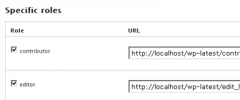Peter's Login Redirect wordpress plugin resources analysis
| Download This Plugin | |
| Download Elegant Themes | |
| Name | Peter's Login Redirect |
| Version | 2.8.2 |
| Author | Peter Keung |
| Rating | 98 |
| Last updated | 2014-12-27 06:07:00 |
| Downloads |
394563
|
| Download Plugins Speed Test plugin for Wordpress | |
Home page
Delta: 0%
Post page
Delta: 0%
Home page PageSpeed score has been degraded by 0%, while Post page PageSpeed score has been degraded by 0%
Peter's Login Redirect plugin added 6 bytes of resources to the Home page and 14 bytes of resources to the sample Post page.
Peter's Login Redirect plugin added 0 new host(s) to the Home page and 0 new host(s) to the sample Post page.
Great! Peter's Login Redirect plugin ads no tables to your Wordpress blog database.Define a set of redirect rules for specific users, users with specific roles, users with specific capabilities, and a blanket rule for all other users. Also, set a redirect URL for post-registration. This is all managed in Settings > Login/logout redirects.
You can use the syntax [variable]username[/variable] in your URLs so that the system will build a dynamic URL upon each login, replacing that text with the user's username. In addition to username, there is "homeurl", "siteurl", "postid-23", "http_referer" and you can also add your own custom URL "variables". See Other Notes / How to Extend for documentation.
If you're using a plugin such as Gigya that bypasses the regular WordPress login redirect process (and only allows one fixed redirect URL), set that plugin to redirect to wp-content/plugins/peters-login-redirect/wplogin_redirect_control.php and set the relevant setting to "Yes" at the bottom of the Settings > Login/Logout redirects page in the WordPress admin panel.
You can add your own code logic before and between any of the plugin's normal redirect checks if needed. See Other Notes / How to Extend for documentation. Some examples include: redirecting the user based on their IP address; and redirect users to a special page on first login.
This plugin also includes a function rul_register that acts the same as the wp_register function you see in templates (typically producing the Register or Site Admin links in the sidebar), except that it will return the custom defined admin address. rul_register takes three parameters: the "before" code (by default "<li>"), the "after" code (by default "</li>"), and whether to echo or return the result (default is true and thus echo).
Translations
- nl_NL translation by Anja of http://www.werkgroepen.net/wordpress/plugins/peters-login-redirect/
- sk_SK translation by Michal Miksik of http://moonpixel.com/michal-miksik/
- ro_RO translation by Anunturi Jibo of http://www.jibo.ro
- cs_CZ translation by Petr Mašek and Michal Kuk
- de_DE translation by Lara of http://www.u-center.nl
- es_ES translation by Closemarketing of http://www.closemarketing.es
- lt_LT translation by Vincent G of http://www.host1free.com
- da_DK translation by Tom of http://artikelforlaget.dk
- id_ID translation by Syamsul Alam of http://www.syamsulalam.net/
- uk translation by Yura
- sr_RS translation by Borisa Djuraskovic of http://www.webhostinghub.com/
- fr_FR translation by DomBonj
- pt_BR translation by Graal4


